Business 15: Impact of Accounting Information System Implementation
VerifiedAdded on 2021/05/31
|21
|5206
|21
Report
AI Summary
This report investigates the impact of Accounting Information System (AIS) implementation on businesses, focusing on organizational effectiveness, internal controls, and decision-making processes. It begins with an executive summary, followed by an introduction that highlights the importance of AIS in the current competitive business environment. The report explores the research problem, justification for the study, and aims and objectives, which include evaluating the roles of AIS, assessing management awareness, and understanding the effects of AIS on decision-making. A comprehensive literature review defines AIS, explores its relationship with organizational effectiveness, and examines the role of AIS in internal controls. The methodology section outlines the research design, sample population, data collection methods, and data analysis techniques. The report concludes with a discussion of ethical considerations and a list of references.
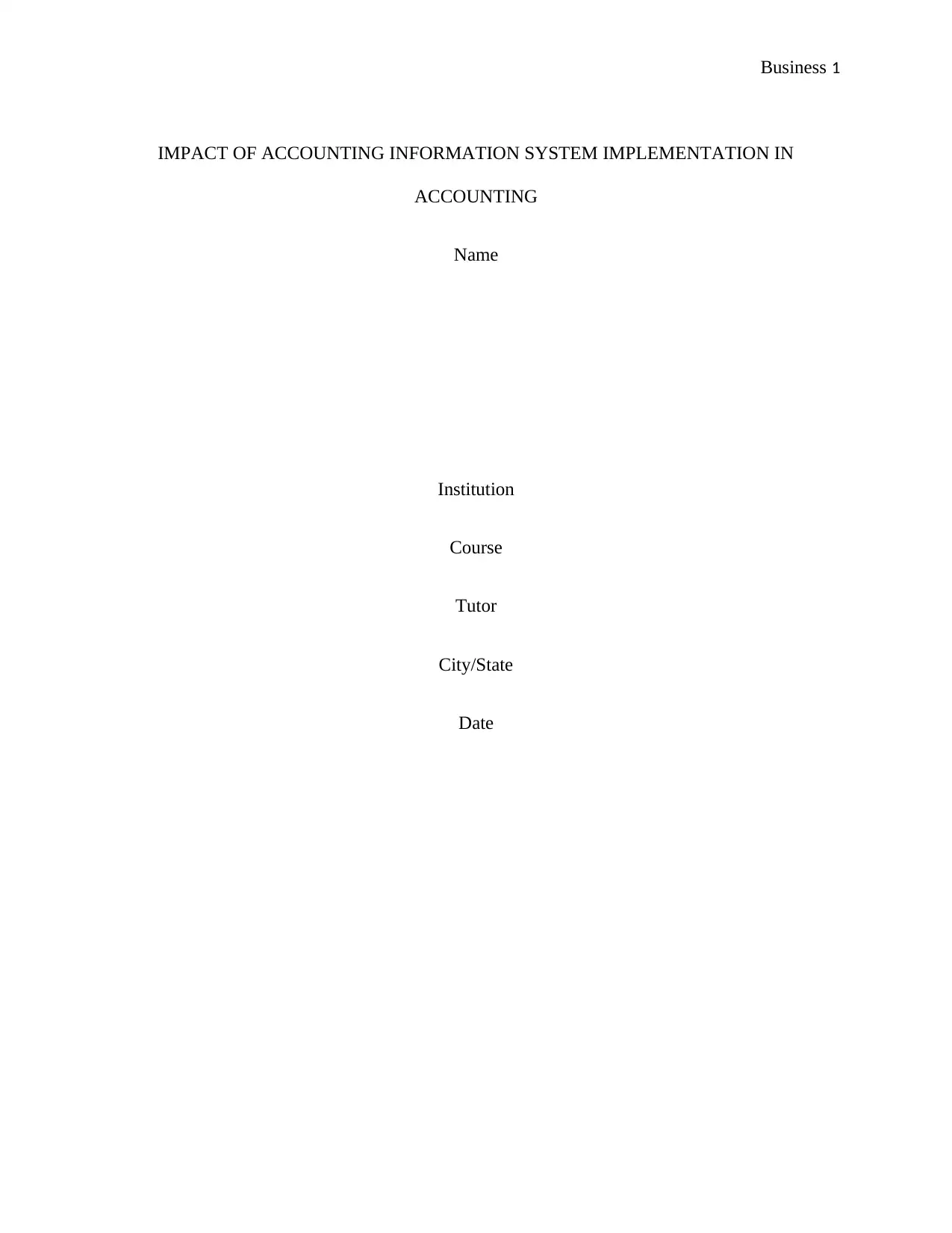
Business 1
IMPACT OF ACCOUNTING INFORMATION SYSTEM IMPLEMENTATION IN
ACCOUNTING
Name
Institution
Course
Tutor
City/State
Date
IMPACT OF ACCOUNTING INFORMATION SYSTEM IMPLEMENTATION IN
ACCOUNTING
Name
Institution
Course
Tutor
City/State
Date
Paraphrase This Document
Need a fresh take? Get an instant paraphrase of this document with our AI Paraphraser
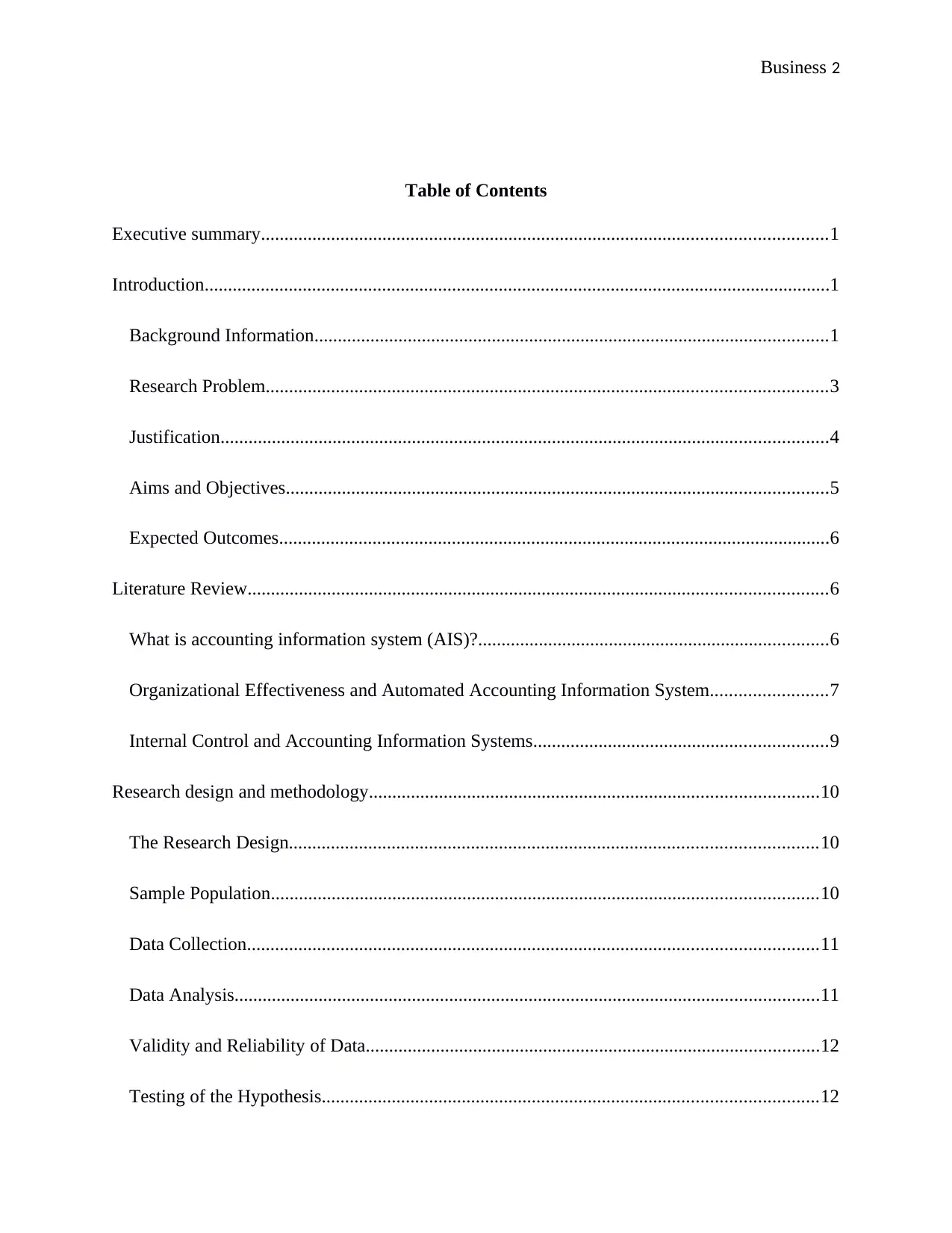
Business 2
Table of Contents
Executive summary.........................................................................................................................1
Introduction......................................................................................................................................1
Background Information..............................................................................................................1
Research Problem........................................................................................................................3
Justification..................................................................................................................................4
Aims and Objectives....................................................................................................................5
Expected Outcomes......................................................................................................................6
Literature Review............................................................................................................................6
What is accounting information system (AIS)?...........................................................................6
Organizational Effectiveness and Automated Accounting Information System.........................7
Internal Control and Accounting Information Systems...............................................................9
Research design and methodology................................................................................................10
The Research Design.................................................................................................................10
Sample Population.....................................................................................................................10
Data Collection..........................................................................................................................11
Data Analysis.............................................................................................................................11
Validity and Reliability of Data.................................................................................................12
Testing of the Hypothesis..........................................................................................................12
Table of Contents
Executive summary.........................................................................................................................1
Introduction......................................................................................................................................1
Background Information..............................................................................................................1
Research Problem........................................................................................................................3
Justification..................................................................................................................................4
Aims and Objectives....................................................................................................................5
Expected Outcomes......................................................................................................................6
Literature Review............................................................................................................................6
What is accounting information system (AIS)?...........................................................................6
Organizational Effectiveness and Automated Accounting Information System.........................7
Internal Control and Accounting Information Systems...............................................................9
Research design and methodology................................................................................................10
The Research Design.................................................................................................................10
Sample Population.....................................................................................................................10
Data Collection..........................................................................................................................11
Data Analysis.............................................................................................................................11
Validity and Reliability of Data.................................................................................................12
Testing of the Hypothesis..........................................................................................................12

Business 3
Ethical consideration.....................................................................................................................13
List of References..........................................................................................................................14
Ethical consideration.....................................................................................................................13
List of References..........................................................................................................................14
⊘ This is a preview!⊘
Do you want full access?
Subscribe today to unlock all pages.

Trusted by 1+ million students worldwide
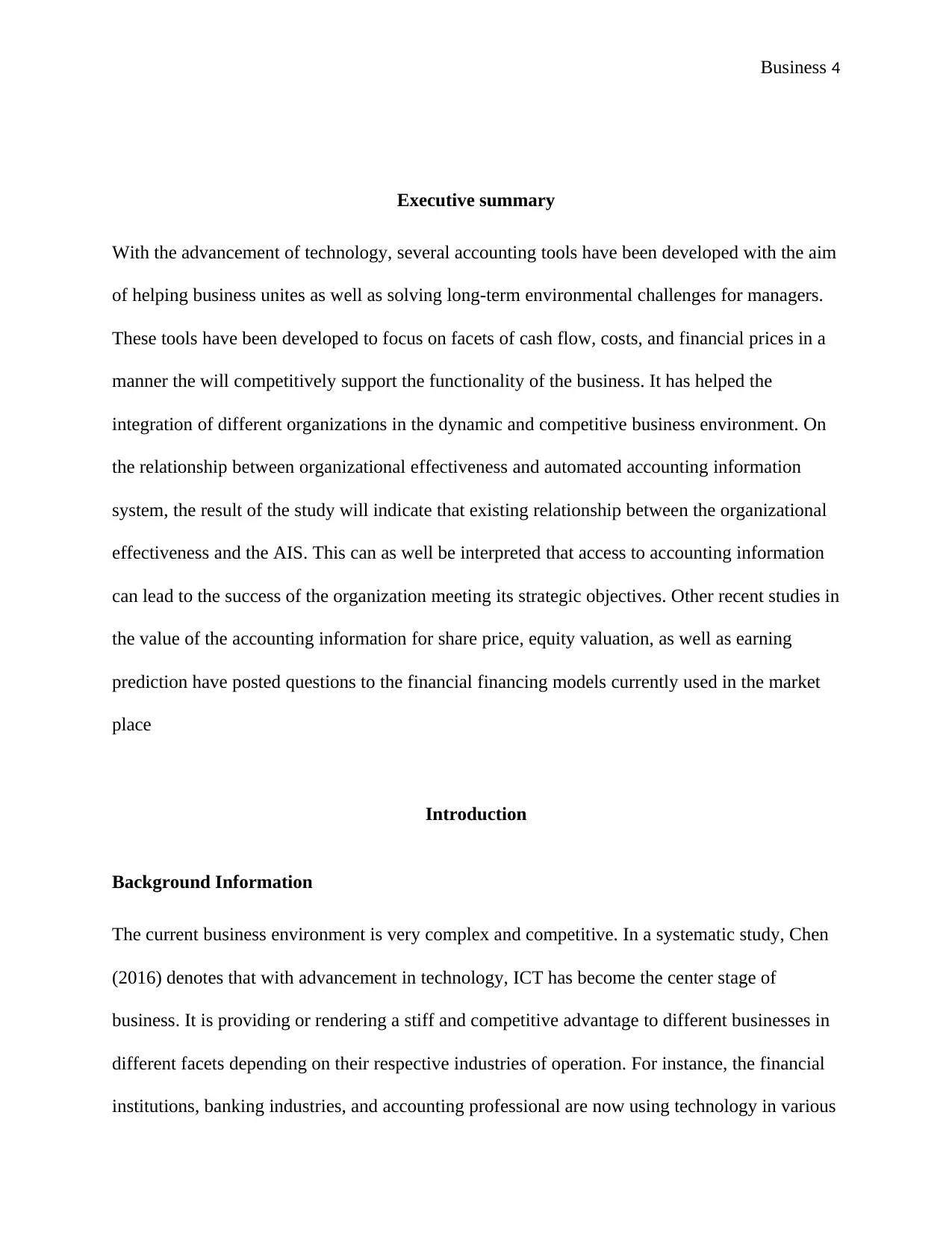
Business 4
Executive summary
With the advancement of technology, several accounting tools have been developed with the aim
of helping business unites as well as solving long-term environmental challenges for managers.
These tools have been developed to focus on facets of cash flow, costs, and financial prices in a
manner the will competitively support the functionality of the business. It has helped the
integration of different organizations in the dynamic and competitive business environment. On
the relationship between organizational effectiveness and automated accounting information
system, the result of the study will indicate that existing relationship between the organizational
effectiveness and the AIS. This can as well be interpreted that access to accounting information
can lead to the success of the organization meeting its strategic objectives. Other recent studies in
the value of the accounting information for share price, equity valuation, as well as earning
prediction have posted questions to the financial financing models currently used in the market
place
Introduction
Background Information
The current business environment is very complex and competitive. In a systematic study, Chen
(2016) denotes that with advancement in technology, ICT has become the center stage of
business. It is providing or rendering a stiff and competitive advantage to different businesses in
different facets depending on their respective industries of operation. For instance, the financial
institutions, banking industries, and accounting professional are now using technology in various
Executive summary
With the advancement of technology, several accounting tools have been developed with the aim
of helping business unites as well as solving long-term environmental challenges for managers.
These tools have been developed to focus on facets of cash flow, costs, and financial prices in a
manner the will competitively support the functionality of the business. It has helped the
integration of different organizations in the dynamic and competitive business environment. On
the relationship between organizational effectiveness and automated accounting information
system, the result of the study will indicate that existing relationship between the organizational
effectiveness and the AIS. This can as well be interpreted that access to accounting information
can lead to the success of the organization meeting its strategic objectives. Other recent studies in
the value of the accounting information for share price, equity valuation, as well as earning
prediction have posted questions to the financial financing models currently used in the market
place
Introduction
Background Information
The current business environment is very complex and competitive. In a systematic study, Chen
(2016) denotes that with advancement in technology, ICT has become the center stage of
business. It is providing or rendering a stiff and competitive advantage to different businesses in
different facets depending on their respective industries of operation. For instance, the financial
institutions, banking industries, and accounting professional are now using technology in various
Paraphrase This Document
Need a fresh take? Get an instant paraphrase of this document with our AI Paraphraser
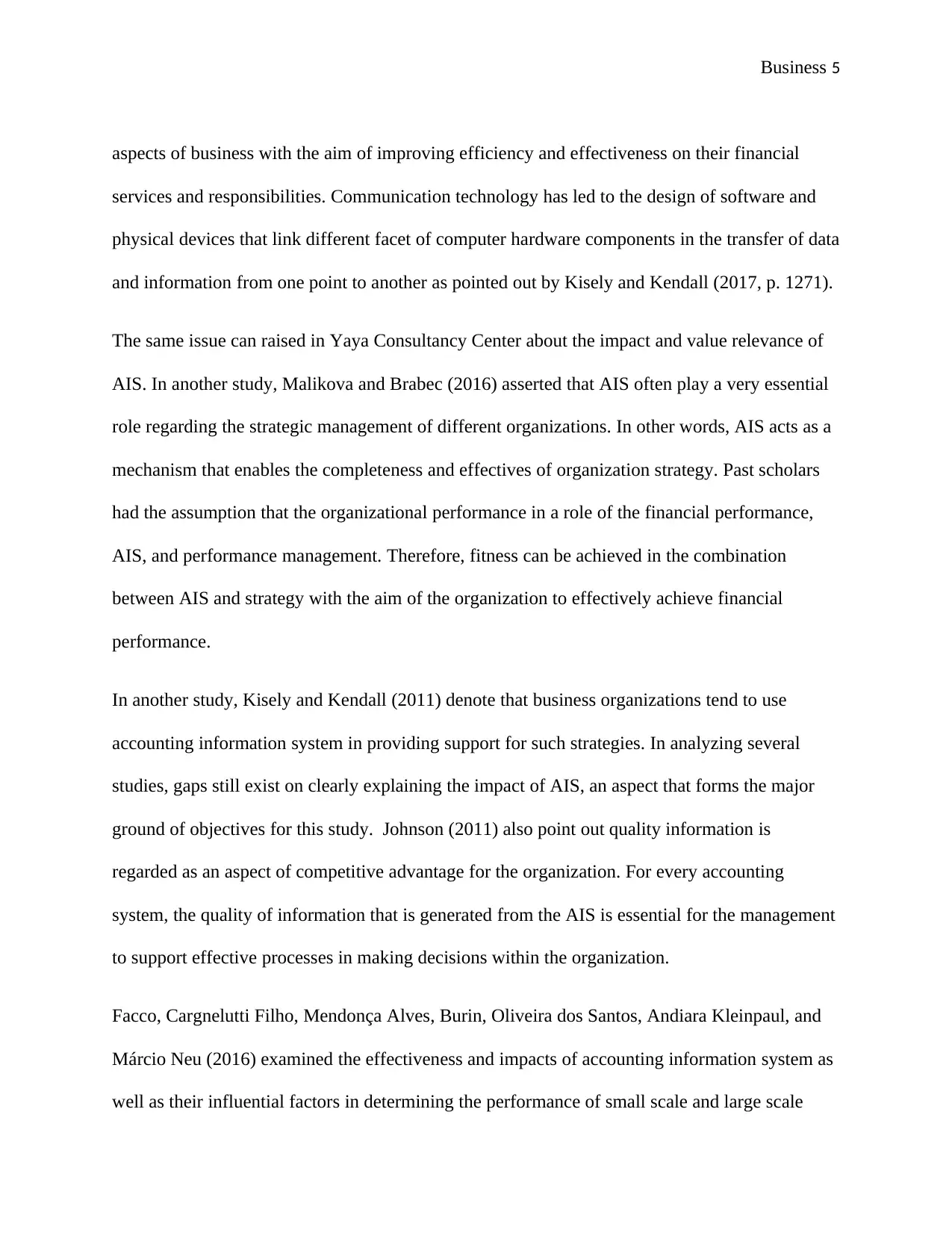
Business 5
aspects of business with the aim of improving efficiency and effectiveness on their financial
services and responsibilities. Communication technology has led to the design of software and
physical devices that link different facet of computer hardware components in the transfer of data
and information from one point to another as pointed out by Kisely and Kendall (2017, p. 1271).
The same issue can raised in Yaya Consultancy Center about the impact and value relevance of
AIS. In another study, Malikova and Brabec (2016) asserted that AIS often play a very essential
role regarding the strategic management of different organizations. In other words, AIS acts as a
mechanism that enables the completeness and effectives of organization strategy. Past scholars
had the assumption that the organizational performance in a role of the financial performance,
AIS, and performance management. Therefore, fitness can be achieved in the combination
between AIS and strategy with the aim of the organization to effectively achieve financial
performance.
In another study, Kisely and Kendall (2011) denote that business organizations tend to use
accounting information system in providing support for such strategies. In analyzing several
studies, gaps still exist on clearly explaining the impact of AIS, an aspect that forms the major
ground of objectives for this study. Johnson (2011) also point out quality information is
regarded as an aspect of competitive advantage for the organization. For every accounting
system, the quality of information that is generated from the AIS is essential for the management
to support effective processes in making decisions within the organization.
Facco, Cargnelutti Filho, Mendonça Alves, Burin, Oliveira dos Santos, Andiara Kleinpaul, and
Márcio Neu (2016) examined the effectiveness and impacts of accounting information system as
well as their influential factors in determining the performance of small scale and large scale
aspects of business with the aim of improving efficiency and effectiveness on their financial
services and responsibilities. Communication technology has led to the design of software and
physical devices that link different facet of computer hardware components in the transfer of data
and information from one point to another as pointed out by Kisely and Kendall (2017, p. 1271).
The same issue can raised in Yaya Consultancy Center about the impact and value relevance of
AIS. In another study, Malikova and Brabec (2016) asserted that AIS often play a very essential
role regarding the strategic management of different organizations. In other words, AIS acts as a
mechanism that enables the completeness and effectives of organization strategy. Past scholars
had the assumption that the organizational performance in a role of the financial performance,
AIS, and performance management. Therefore, fitness can be achieved in the combination
between AIS and strategy with the aim of the organization to effectively achieve financial
performance.
In another study, Kisely and Kendall (2011) denote that business organizations tend to use
accounting information system in providing support for such strategies. In analyzing several
studies, gaps still exist on clearly explaining the impact of AIS, an aspect that forms the major
ground of objectives for this study. Johnson (2011) also point out quality information is
regarded as an aspect of competitive advantage for the organization. For every accounting
system, the quality of information that is generated from the AIS is essential for the management
to support effective processes in making decisions within the organization.
Facco, Cargnelutti Filho, Mendonça Alves, Burin, Oliveira dos Santos, Andiara Kleinpaul, and
Márcio Neu (2016) examined the effectiveness and impacts of accounting information system as
well as their influential factors in determining the performance of small scale and large scale
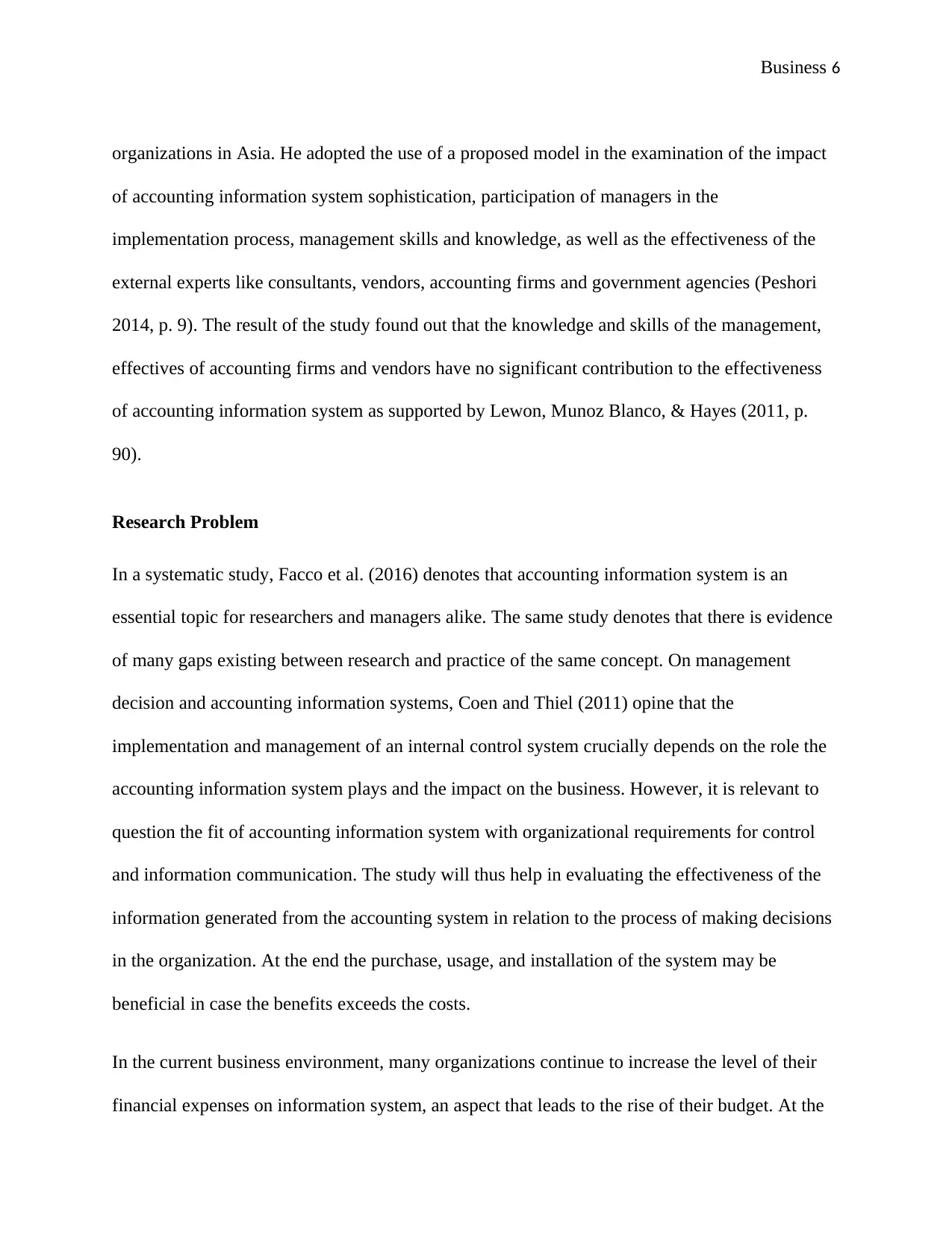
Business 6
organizations in Asia. He adopted the use of a proposed model in the examination of the impact
of accounting information system sophistication, participation of managers in the
implementation process, management skills and knowledge, as well as the effectiveness of the
external experts like consultants, vendors, accounting firms and government agencies (Peshori
2014, p. 9). The result of the study found out that the knowledge and skills of the management,
effectives of accounting firms and vendors have no significant contribution to the effectiveness
of accounting information system as supported by Lewon, Munoz Blanco, & Hayes (2011, p.
90).
Research Problem
In a systematic study, Facco et al. (2016) denotes that accounting information system is an
essential topic for researchers and managers alike. The same study denotes that there is evidence
of many gaps existing between research and practice of the same concept. On management
decision and accounting information systems, Coen and Thiel (2011) opine that the
implementation and management of an internal control system crucially depends on the role the
accounting information system plays and the impact on the business. However, it is relevant to
question the fit of accounting information system with organizational requirements for control
and information communication. The study will thus help in evaluating the effectiveness of the
information generated from the accounting system in relation to the process of making decisions
in the organization. At the end the purchase, usage, and installation of the system may be
beneficial in case the benefits exceeds the costs.
In the current business environment, many organizations continue to increase the level of their
financial expenses on information system, an aspect that leads to the rise of their budget. At the
organizations in Asia. He adopted the use of a proposed model in the examination of the impact
of accounting information system sophistication, participation of managers in the
implementation process, management skills and knowledge, as well as the effectiveness of the
external experts like consultants, vendors, accounting firms and government agencies (Peshori
2014, p. 9). The result of the study found out that the knowledge and skills of the management,
effectives of accounting firms and vendors have no significant contribution to the effectiveness
of accounting information system as supported by Lewon, Munoz Blanco, & Hayes (2011, p.
90).
Research Problem
In a systematic study, Facco et al. (2016) denotes that accounting information system is an
essential topic for researchers and managers alike. The same study denotes that there is evidence
of many gaps existing between research and practice of the same concept. On management
decision and accounting information systems, Coen and Thiel (2011) opine that the
implementation and management of an internal control system crucially depends on the role the
accounting information system plays and the impact on the business. However, it is relevant to
question the fit of accounting information system with organizational requirements for control
and information communication. The study will thus help in evaluating the effectiveness of the
information generated from the accounting system in relation to the process of making decisions
in the organization. At the end the purchase, usage, and installation of the system may be
beneficial in case the benefits exceeds the costs.
In the current business environment, many organizations continue to increase the level of their
financial expenses on information system, an aspect that leads to the rise of their budget. At the
⊘ This is a preview!⊘
Do you want full access?
Subscribe today to unlock all pages.

Trusted by 1+ million students worldwide
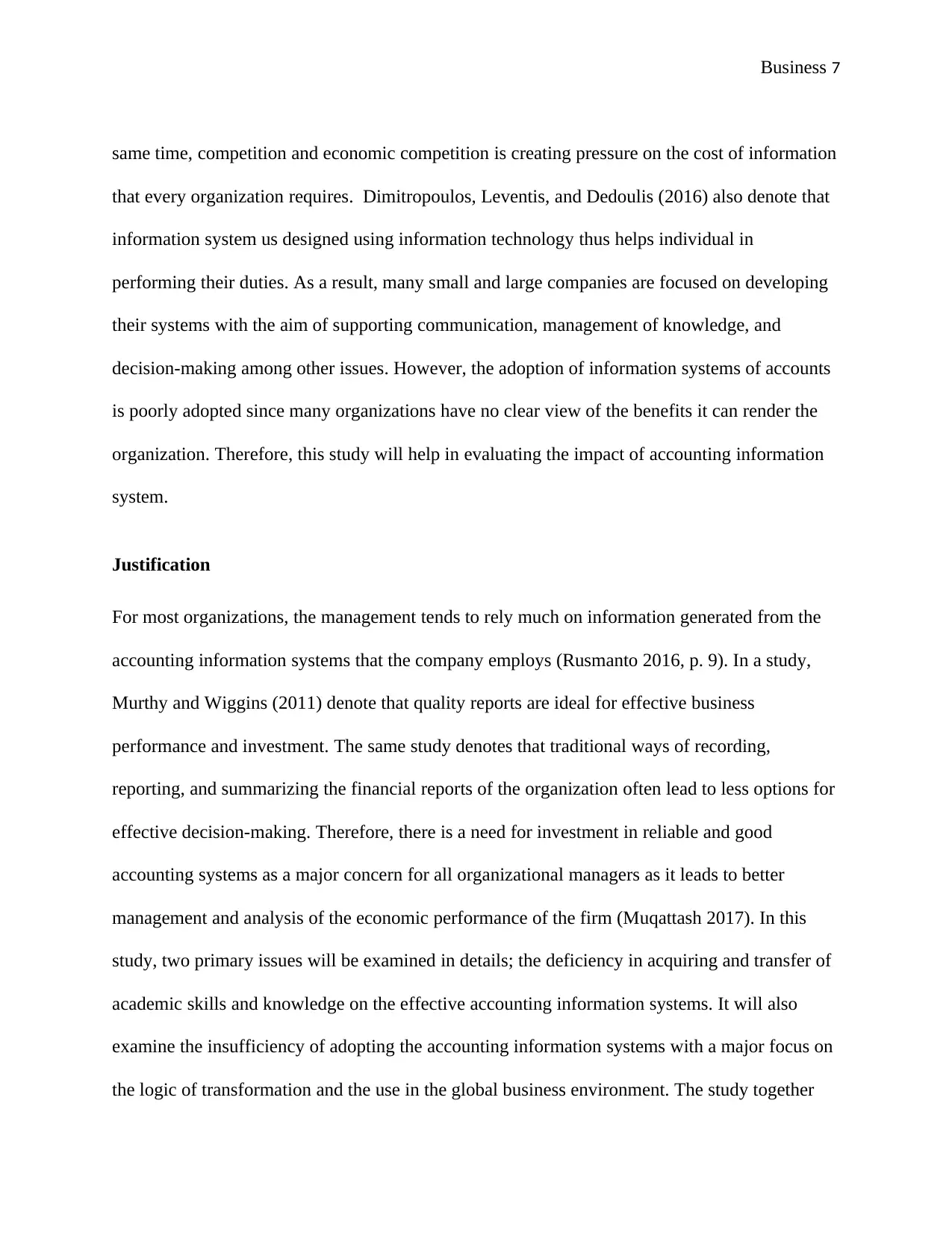
Business 7
same time, competition and economic competition is creating pressure on the cost of information
that every organization requires. Dimitropoulos, Leventis, and Dedoulis (2016) also denote that
information system us designed using information technology thus helps individual in
performing their duties. As a result, many small and large companies are focused on developing
their systems with the aim of supporting communication, management of knowledge, and
decision-making among other issues. However, the adoption of information systems of accounts
is poorly adopted since many organizations have no clear view of the benefits it can render the
organization. Therefore, this study will help in evaluating the impact of accounting information
system.
Justification
For most organizations, the management tends to rely much on information generated from the
accounting information systems that the company employs (Rusmanto 2016, p. 9). In a study,
Murthy and Wiggins (2011) denote that quality reports are ideal for effective business
performance and investment. The same study denotes that traditional ways of recording,
reporting, and summarizing the financial reports of the organization often lead to less options for
effective decision-making. Therefore, there is a need for investment in reliable and good
accounting systems as a major concern for all organizational managers as it leads to better
management and analysis of the economic performance of the firm (Muqattash 2017). In this
study, two primary issues will be examined in details; the deficiency in acquiring and transfer of
academic skills and knowledge on the effective accounting information systems. It will also
examine the insufficiency of adopting the accounting information systems with a major focus on
the logic of transformation and the use in the global business environment. The study together
same time, competition and economic competition is creating pressure on the cost of information
that every organization requires. Dimitropoulos, Leventis, and Dedoulis (2016) also denote that
information system us designed using information technology thus helps individual in
performing their duties. As a result, many small and large companies are focused on developing
their systems with the aim of supporting communication, management of knowledge, and
decision-making among other issues. However, the adoption of information systems of accounts
is poorly adopted since many organizations have no clear view of the benefits it can render the
organization. Therefore, this study will help in evaluating the impact of accounting information
system.
Justification
For most organizations, the management tends to rely much on information generated from the
accounting information systems that the company employs (Rusmanto 2016, p. 9). In a study,
Murthy and Wiggins (2011) denote that quality reports are ideal for effective business
performance and investment. The same study denotes that traditional ways of recording,
reporting, and summarizing the financial reports of the organization often lead to less options for
effective decision-making. Therefore, there is a need for investment in reliable and good
accounting systems as a major concern for all organizational managers as it leads to better
management and analysis of the economic performance of the firm (Muqattash 2017). In this
study, two primary issues will be examined in details; the deficiency in acquiring and transfer of
academic skills and knowledge on the effective accounting information systems. It will also
examine the insufficiency of adopting the accounting information systems with a major focus on
the logic of transformation and the use in the global business environment. The study together
Paraphrase This Document
Need a fresh take? Get an instant paraphrase of this document with our AI Paraphraser
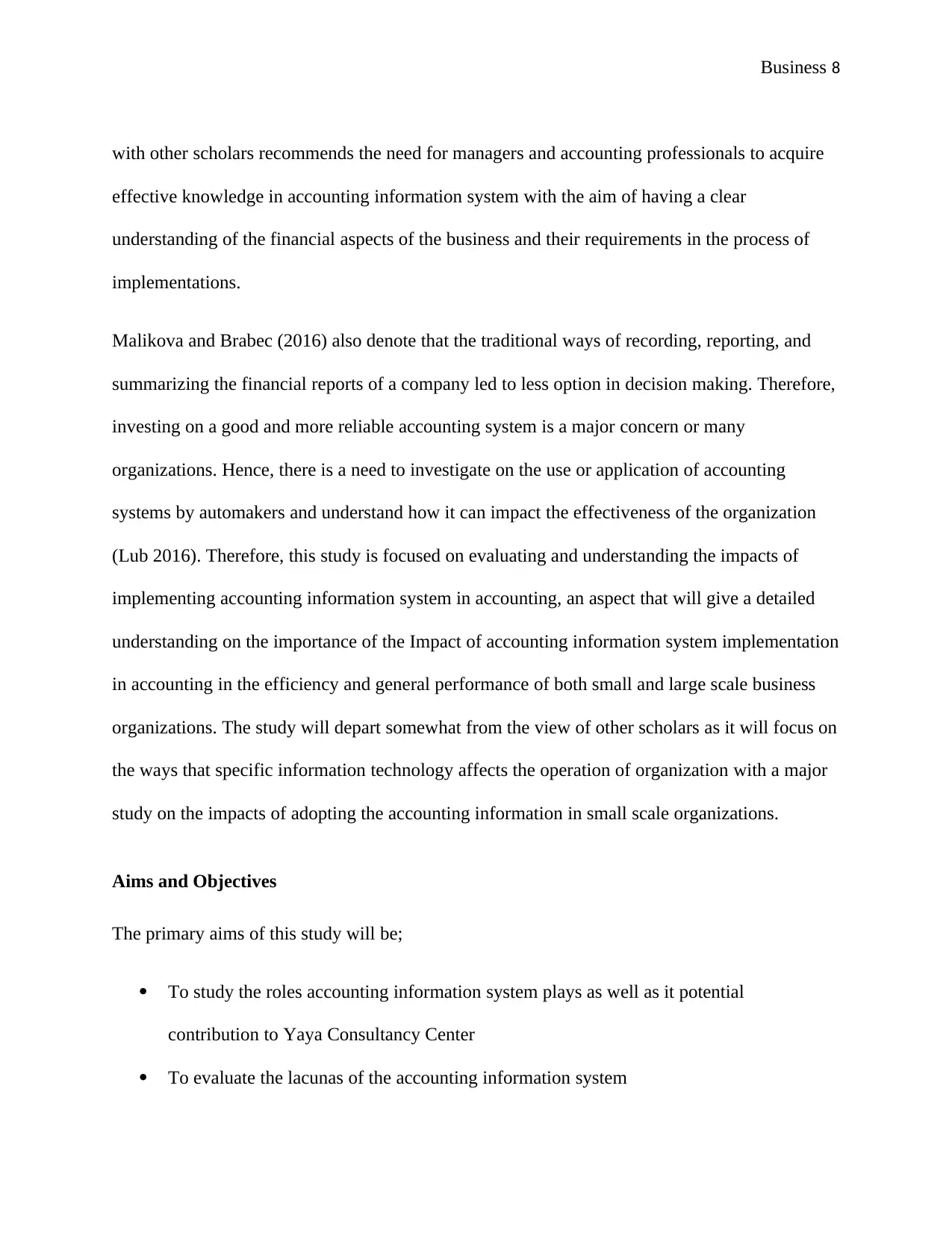
Business 8
with other scholars recommends the need for managers and accounting professionals to acquire
effective knowledge in accounting information system with the aim of having a clear
understanding of the financial aspects of the business and their requirements in the process of
implementations.
Malikova and Brabec (2016) also denote that the traditional ways of recording, reporting, and
summarizing the financial reports of a company led to less option in decision making. Therefore,
investing on a good and more reliable accounting system is a major concern or many
organizations. Hence, there is a need to investigate on the use or application of accounting
systems by automakers and understand how it can impact the effectiveness of the organization
(Lub 2016). Therefore, this study is focused on evaluating and understanding the impacts of
implementing accounting information system in accounting, an aspect that will give a detailed
understanding on the importance of the Impact of accounting information system implementation
in accounting in the efficiency and general performance of both small and large scale business
organizations. The study will depart somewhat from the view of other scholars as it will focus on
the ways that specific information technology affects the operation of organization with a major
study on the impacts of adopting the accounting information in small scale organizations.
Aims and Objectives
The primary aims of this study will be;
To study the roles accounting information system plays as well as it potential
contribution to Yaya Consultancy Center
To evaluate the lacunas of the accounting information system
with other scholars recommends the need for managers and accounting professionals to acquire
effective knowledge in accounting information system with the aim of having a clear
understanding of the financial aspects of the business and their requirements in the process of
implementations.
Malikova and Brabec (2016) also denote that the traditional ways of recording, reporting, and
summarizing the financial reports of a company led to less option in decision making. Therefore,
investing on a good and more reliable accounting system is a major concern or many
organizations. Hence, there is a need to investigate on the use or application of accounting
systems by automakers and understand how it can impact the effectiveness of the organization
(Lub 2016). Therefore, this study is focused on evaluating and understanding the impacts of
implementing accounting information system in accounting, an aspect that will give a detailed
understanding on the importance of the Impact of accounting information system implementation
in accounting in the efficiency and general performance of both small and large scale business
organizations. The study will depart somewhat from the view of other scholars as it will focus on
the ways that specific information technology affects the operation of organization with a major
study on the impacts of adopting the accounting information in small scale organizations.
Aims and Objectives
The primary aims of this study will be;
To study the roles accounting information system plays as well as it potential
contribution to Yaya Consultancy Center
To evaluate the lacunas of the accounting information system
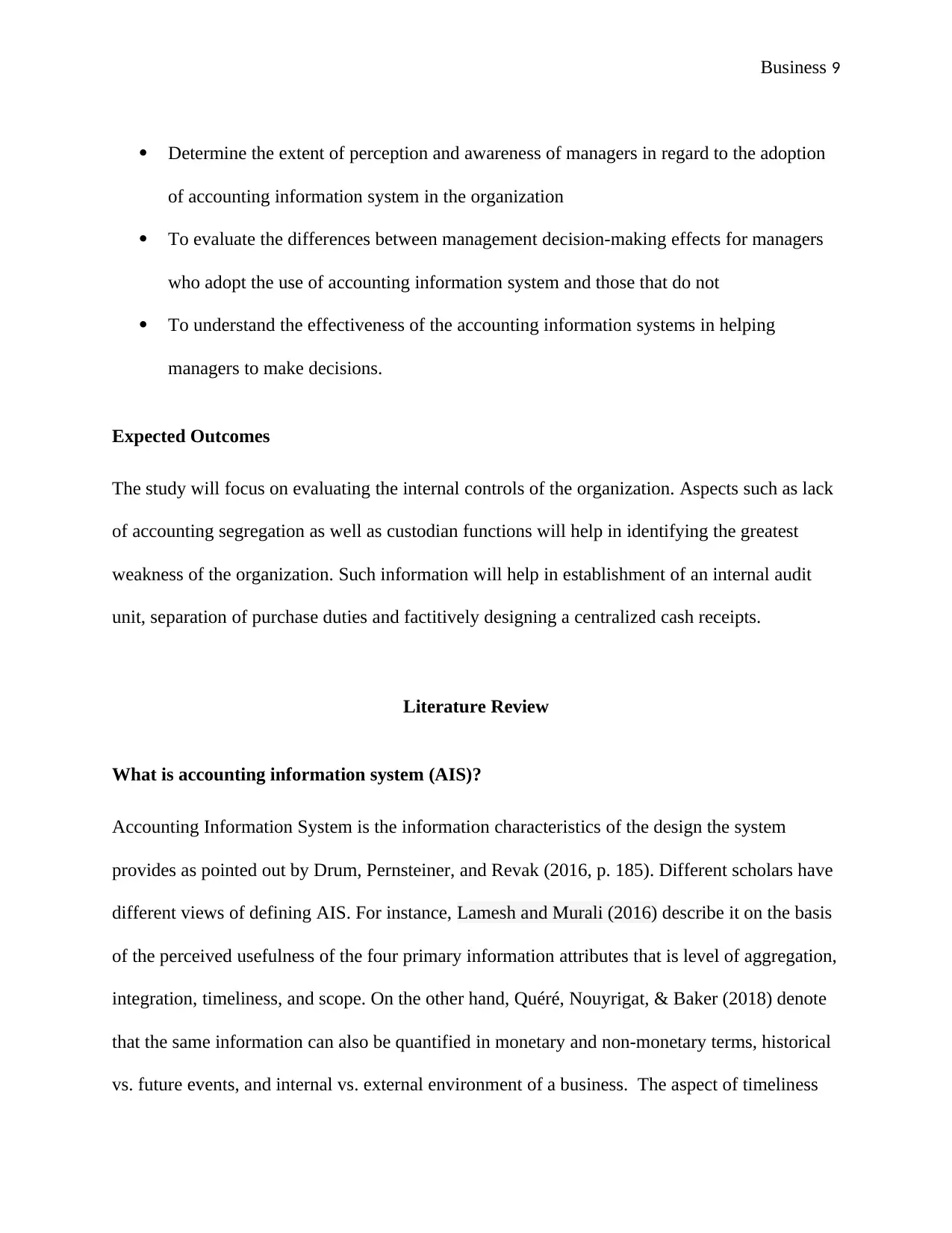
Business 9
Determine the extent of perception and awareness of managers in regard to the adoption
of accounting information system in the organization
To evaluate the differences between management decision-making effects for managers
who adopt the use of accounting information system and those that do not
To understand the effectiveness of the accounting information systems in helping
managers to make decisions.
Expected Outcomes
The study will focus on evaluating the internal controls of the organization. Aspects such as lack
of accounting segregation as well as custodian functions will help in identifying the greatest
weakness of the organization. Such information will help in establishment of an internal audit
unit, separation of purchase duties and factitively designing a centralized cash receipts.
Literature Review
What is accounting information system (AIS)?
Accounting Information System is the information characteristics of the design the system
provides as pointed out by Drum, Pernsteiner, and Revak (2016, p. 185). Different scholars have
different views of defining AIS. For instance, Lamesh and Murali (2016) describe it on the basis
of the perceived usefulness of the four primary information attributes that is level of aggregation,
integration, timeliness, and scope. On the other hand, Quéré, Nouyrigat, & Baker (2018) denote
that the same information can also be quantified in monetary and non-monetary terms, historical
vs. future events, and internal vs. external environment of a business. The aspect of timeliness
Determine the extent of perception and awareness of managers in regard to the adoption
of accounting information system in the organization
To evaluate the differences between management decision-making effects for managers
who adopt the use of accounting information system and those that do not
To understand the effectiveness of the accounting information systems in helping
managers to make decisions.
Expected Outcomes
The study will focus on evaluating the internal controls of the organization. Aspects such as lack
of accounting segregation as well as custodian functions will help in identifying the greatest
weakness of the organization. Such information will help in establishment of an internal audit
unit, separation of purchase duties and factitively designing a centralized cash receipts.
Literature Review
What is accounting information system (AIS)?
Accounting Information System is the information characteristics of the design the system
provides as pointed out by Drum, Pernsteiner, and Revak (2016, p. 185). Different scholars have
different views of defining AIS. For instance, Lamesh and Murali (2016) describe it on the basis
of the perceived usefulness of the four primary information attributes that is level of aggregation,
integration, timeliness, and scope. On the other hand, Quéré, Nouyrigat, & Baker (2018) denote
that the same information can also be quantified in monetary and non-monetary terms, historical
vs. future events, and internal vs. external environment of a business. The aspect of timeliness
⊘ This is a preview!⊘
Do you want full access?
Subscribe today to unlock all pages.

Trusted by 1+ million students worldwide
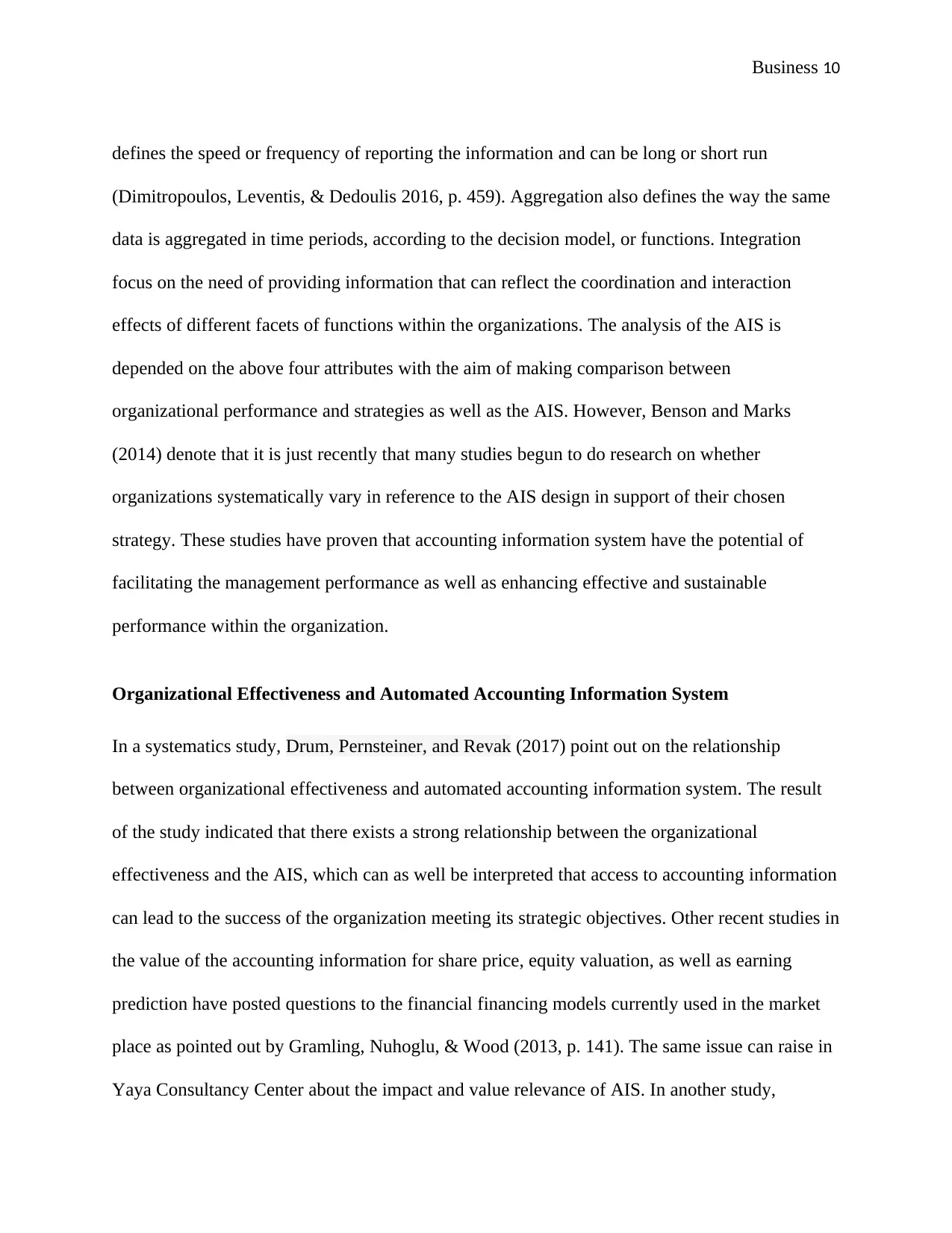
Business 10
defines the speed or frequency of reporting the information and can be long or short run
(Dimitropoulos, Leventis, & Dedoulis 2016, p. 459). Aggregation also defines the way the same
data is aggregated in time periods, according to the decision model, or functions. Integration
focus on the need of providing information that can reflect the coordination and interaction
effects of different facets of functions within the organizations. The analysis of the AIS is
depended on the above four attributes with the aim of making comparison between
organizational performance and strategies as well as the AIS. However, Benson and Marks
(2014) denote that it is just recently that many studies begun to do research on whether
organizations systematically vary in reference to the AIS design in support of their chosen
strategy. These studies have proven that accounting information system have the potential of
facilitating the management performance as well as enhancing effective and sustainable
performance within the organization.
Organizational Effectiveness and Automated Accounting Information System
In a systematics study, Drum, Pernsteiner, and Revak (2017) point out on the relationship
between organizational effectiveness and automated accounting information system. The result
of the study indicated that there exists a strong relationship between the organizational
effectiveness and the AIS, which can as well be interpreted that access to accounting information
can lead to the success of the organization meeting its strategic objectives. Other recent studies in
the value of the accounting information for share price, equity valuation, as well as earning
prediction have posted questions to the financial financing models currently used in the market
place as pointed out by Gramling, Nuhoglu, & Wood (2013, p. 141). The same issue can raise in
Yaya Consultancy Center about the impact and value relevance of AIS. In another study,
defines the speed or frequency of reporting the information and can be long or short run
(Dimitropoulos, Leventis, & Dedoulis 2016, p. 459). Aggregation also defines the way the same
data is aggregated in time periods, according to the decision model, or functions. Integration
focus on the need of providing information that can reflect the coordination and interaction
effects of different facets of functions within the organizations. The analysis of the AIS is
depended on the above four attributes with the aim of making comparison between
organizational performance and strategies as well as the AIS. However, Benson and Marks
(2014) denote that it is just recently that many studies begun to do research on whether
organizations systematically vary in reference to the AIS design in support of their chosen
strategy. These studies have proven that accounting information system have the potential of
facilitating the management performance as well as enhancing effective and sustainable
performance within the organization.
Organizational Effectiveness and Automated Accounting Information System
In a systematics study, Drum, Pernsteiner, and Revak (2017) point out on the relationship
between organizational effectiveness and automated accounting information system. The result
of the study indicated that there exists a strong relationship between the organizational
effectiveness and the AIS, which can as well be interpreted that access to accounting information
can lead to the success of the organization meeting its strategic objectives. Other recent studies in
the value of the accounting information for share price, equity valuation, as well as earning
prediction have posted questions to the financial financing models currently used in the market
place as pointed out by Gramling, Nuhoglu, & Wood (2013, p. 141). The same issue can raise in
Yaya Consultancy Center about the impact and value relevance of AIS. In another study,
Paraphrase This Document
Need a fresh take? Get an instant paraphrase of this document with our AI Paraphraser
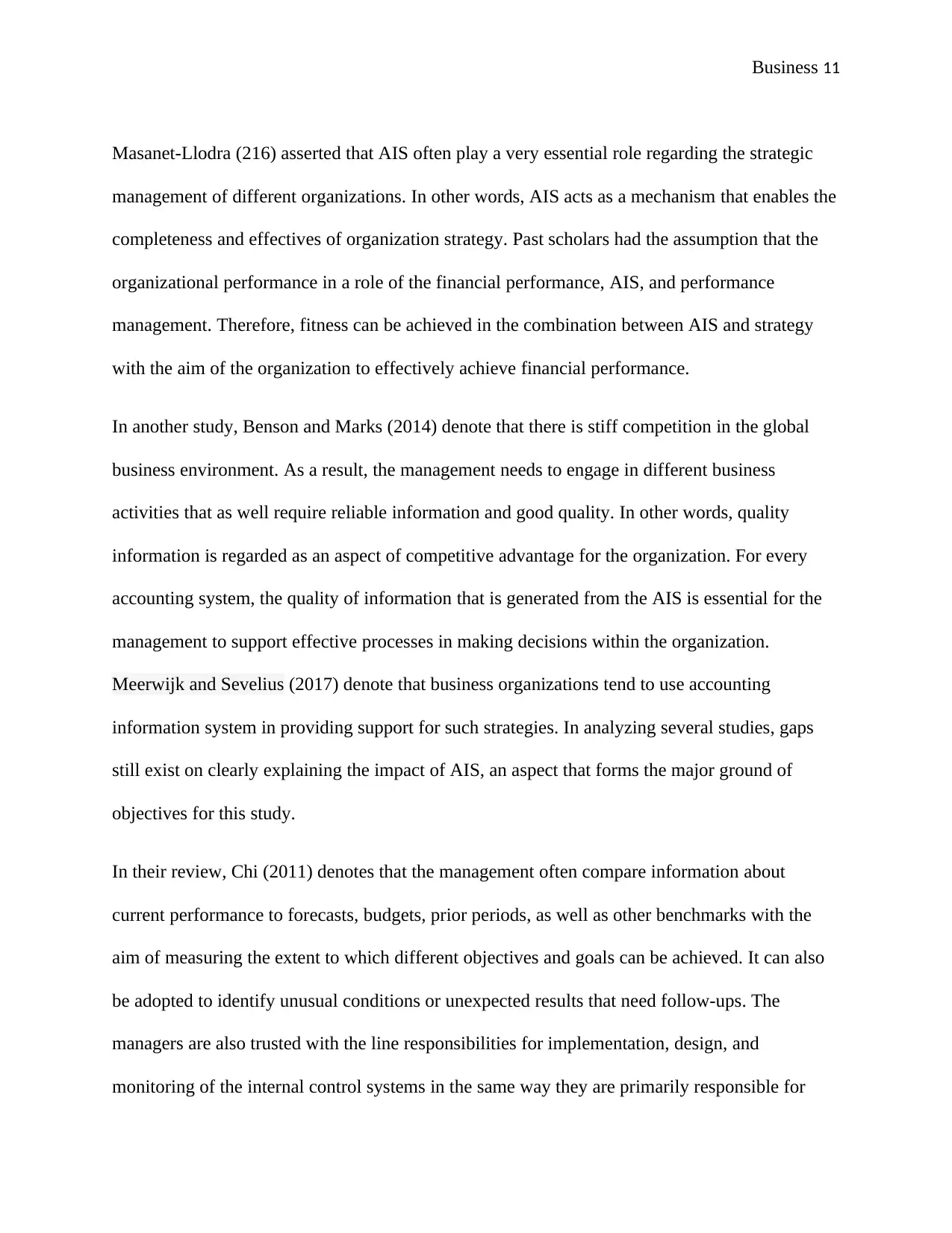
Business 11
Masanet-Llodra (216) asserted that AIS often play a very essential role regarding the strategic
management of different organizations. In other words, AIS acts as a mechanism that enables the
completeness and effectives of organization strategy. Past scholars had the assumption that the
organizational performance in a role of the financial performance, AIS, and performance
management. Therefore, fitness can be achieved in the combination between AIS and strategy
with the aim of the organization to effectively achieve financial performance.
In another study, Benson and Marks (2014) denote that there is stiff competition in the global
business environment. As a result, the management needs to engage in different business
activities that as well require reliable information and good quality. In other words, quality
information is regarded as an aspect of competitive advantage for the organization. For every
accounting system, the quality of information that is generated from the AIS is essential for the
management to support effective processes in making decisions within the organization.
Meerwijk and Sevelius (2017) denote that business organizations tend to use accounting
information system in providing support for such strategies. In analyzing several studies, gaps
still exist on clearly explaining the impact of AIS, an aspect that forms the major ground of
objectives for this study.
In their review, Chi (2011) denotes that the management often compare information about
current performance to forecasts, budgets, prior periods, as well as other benchmarks with the
aim of measuring the extent to which different objectives and goals can be achieved. It can also
be adopted to identify unusual conditions or unexpected results that need follow-ups. The
managers are also trusted with the line responsibilities for implementation, design, and
monitoring of the internal control systems in the same way they are primarily responsible for
Masanet-Llodra (216) asserted that AIS often play a very essential role regarding the strategic
management of different organizations. In other words, AIS acts as a mechanism that enables the
completeness and effectives of organization strategy. Past scholars had the assumption that the
organizational performance in a role of the financial performance, AIS, and performance
management. Therefore, fitness can be achieved in the combination between AIS and strategy
with the aim of the organization to effectively achieve financial performance.
In another study, Benson and Marks (2014) denote that there is stiff competition in the global
business environment. As a result, the management needs to engage in different business
activities that as well require reliable information and good quality. In other words, quality
information is regarded as an aspect of competitive advantage for the organization. For every
accounting system, the quality of information that is generated from the AIS is essential for the
management to support effective processes in making decisions within the organization.
Meerwijk and Sevelius (2017) denote that business organizations tend to use accounting
information system in providing support for such strategies. In analyzing several studies, gaps
still exist on clearly explaining the impact of AIS, an aspect that forms the major ground of
objectives for this study.
In their review, Chi (2011) denotes that the management often compare information about
current performance to forecasts, budgets, prior periods, as well as other benchmarks with the
aim of measuring the extent to which different objectives and goals can be achieved. It can also
be adopted to identify unusual conditions or unexpected results that need follow-ups. The
managers are also trusted with the line responsibilities for implementation, design, and
monitoring of the internal control systems in the same way they are primarily responsible for
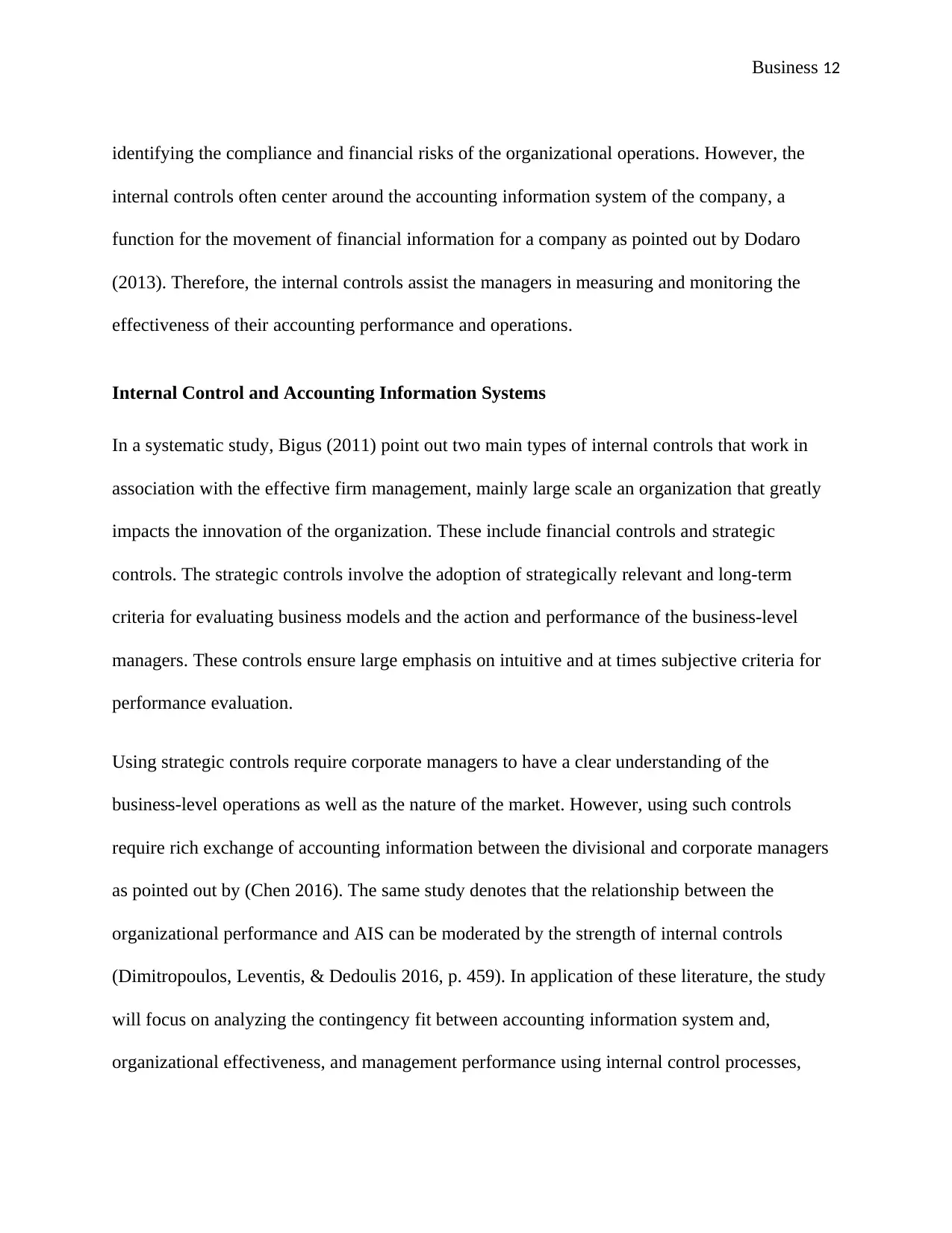
Business 12
identifying the compliance and financial risks of the organizational operations. However, the
internal controls often center around the accounting information system of the company, a
function for the movement of financial information for a company as pointed out by Dodaro
(2013). Therefore, the internal controls assist the managers in measuring and monitoring the
effectiveness of their accounting performance and operations.
Internal Control and Accounting Information Systems
In a systematic study, Bigus (2011) point out two main types of internal controls that work in
association with the effective firm management, mainly large scale an organization that greatly
impacts the innovation of the organization. These include financial controls and strategic
controls. The strategic controls involve the adoption of strategically relevant and long-term
criteria for evaluating business models and the action and performance of the business-level
managers. These controls ensure large emphasis on intuitive and at times subjective criteria for
performance evaluation.
Using strategic controls require corporate managers to have a clear understanding of the
business-level operations as well as the nature of the market. However, using such controls
require rich exchange of accounting information between the divisional and corporate managers
as pointed out by (Chen 2016). The same study denotes that the relationship between the
organizational performance and AIS can be moderated by the strength of internal controls
(Dimitropoulos, Leventis, & Dedoulis 2016, p. 459). In application of these literature, the study
will focus on analyzing the contingency fit between accounting information system and,
organizational effectiveness, and management performance using internal control processes,
identifying the compliance and financial risks of the organizational operations. However, the
internal controls often center around the accounting information system of the company, a
function for the movement of financial information for a company as pointed out by Dodaro
(2013). Therefore, the internal controls assist the managers in measuring and monitoring the
effectiveness of their accounting performance and operations.
Internal Control and Accounting Information Systems
In a systematic study, Bigus (2011) point out two main types of internal controls that work in
association with the effective firm management, mainly large scale an organization that greatly
impacts the innovation of the organization. These include financial controls and strategic
controls. The strategic controls involve the adoption of strategically relevant and long-term
criteria for evaluating business models and the action and performance of the business-level
managers. These controls ensure large emphasis on intuitive and at times subjective criteria for
performance evaluation.
Using strategic controls require corporate managers to have a clear understanding of the
business-level operations as well as the nature of the market. However, using such controls
require rich exchange of accounting information between the divisional and corporate managers
as pointed out by (Chen 2016). The same study denotes that the relationship between the
organizational performance and AIS can be moderated by the strength of internal controls
(Dimitropoulos, Leventis, & Dedoulis 2016, p. 459). In application of these literature, the study
will focus on analyzing the contingency fit between accounting information system and,
organizational effectiveness, and management performance using internal control processes,
⊘ This is a preview!⊘
Do you want full access?
Subscribe today to unlock all pages.

Trusted by 1+ million students worldwide
1 out of 21
Related Documents
Your All-in-One AI-Powered Toolkit for Academic Success.
+13062052269
info@desklib.com
Available 24*7 on WhatsApp / Email
![[object Object]](/_next/static/media/star-bottom.7253800d.svg)
Unlock your academic potential
Copyright © 2020–2026 A2Z Services. All Rights Reserved. Developed and managed by ZUCOL.





